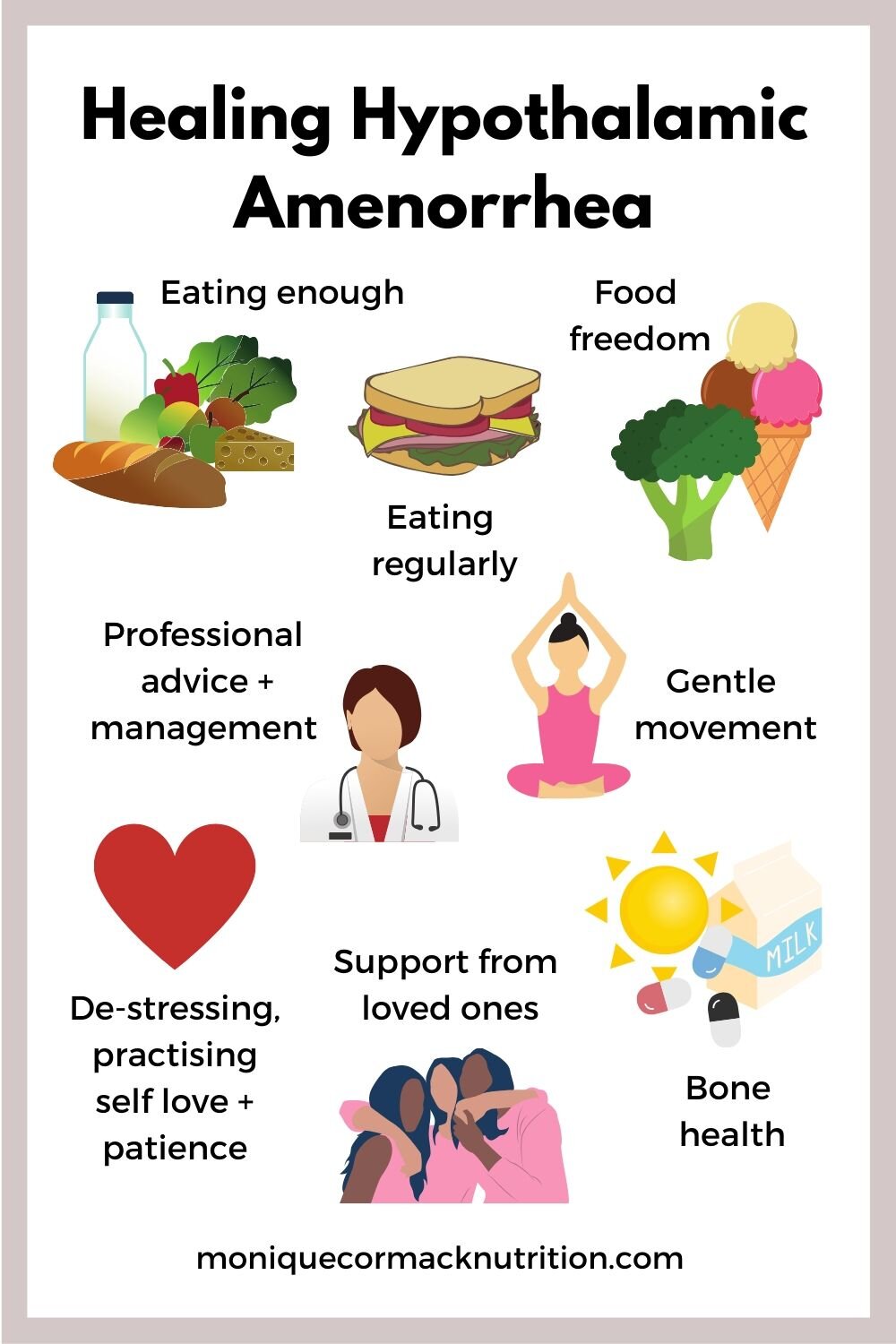7 tips for Healing Hypothalamic Amenorrhea
Are your periods MIA? Have you been told that you have hypothalamic amenorrhea? Read on for my 7 top tips for healing hypothalamic amenorrhea, recovering your periods and restoring your fertility.
What is hypothalamic amenorrhea?
Hypothalamic amenorrhea (HA) is when your periods stop because your body does not produce enough female hormones (oestrogen and progesterone) to have a cycle.
Every month, our bodies need to make oestrogen to help grow an ovarian follicle (which then releases an egg i.e. ovulation) and progesterone to build up our uterine lining (the lining we shed when we get our period).
The production of oestrogen and progesterone is controlled by a part of the brain called the hypothalamus, which is like the body’s hormonal control centre. The hypothalamus usually sends hormones (called FSH and LH) down the hypothalamic-pituitary-axis to the reproductive organs to them to make oestrogen and progesterone, and have a menstrual cycle.
HA occurs when the hypothalamus “switches off” the supply of FSH and LH to make oestrogen and progesterone, resulting in no periods i.e. amenorrhea. Common causes of HA are:
being underweight,
excessive exercise,
high anxiety and stress, and/or
disordered/restrictive eating.
How can you recover from hypothalamic amenorrhea?
I really want to stress that there is NO magic food, diet or supplement that is going to get your period back if you have HA. Addressing HA involves many factors. Some of them are food-related, yes, but there are also psychological & emotional aspects to consider.
Let’s take a look…
ONE.
Correct medical diagnosis and management
A correct medical diagnosis (and ongoing management by supportive professionals) is essential. Amenorrhea can occur for different reasons, so it’s important to establish the cause properly.
This means going to see your doctor, having blood tests and physical examinations, and potentially being referred to a specialist doctor like an endocrinologist. Other causes of amenorrhea, like PCOS (polycystic ovary syndrome) need to be ruled out.
TWO.
Regular, unrestricted nourishment
Nourish your body, find food freedom and honour your hunger. Eat regularly, eat what you truly like and don’t jump onto any dieting trends. Just don’t. If you have HA, you DO NOT need any kind of restriction on when, what and how much you eat.
To recover from HA you need to convince your brain that you are “safe” and energy (i.e. calories!) is readily available. If you restrict, you risk putting yourself in a negative energy balance where your body senses there isn’t enough energy available to support regular periods.
THREE.
Gentle exercise only
Keep exercise gentle. Yes it’s good for us but intense/extensive exercise is a form of “stress” on the body, and may be an obstacle to the return of your menstrual cycle. High intensity workouts or extensive cardio like long distance running can be especially demanding.
Mix it up and try yoga, Pilates or even just a good old gentle stroll (bonus points for getting in some sunshine and walking outdoors - see my last point below for why this is important).
FOUR.
Stress management
Speaking of stress, are you a stressed out person? Consider what could be done to make your days run a little easier, and make some tweaks so you get more chill time. High stress levels - not good for periods!
HA develops because the hypothalamus senses that it is not a safe time for you to have a baby. Your hypothalamus is connected to both your nervous system and your endocrine (hormone) system. It goes like this. You are under stress —> body sends signals to brain through nervous system to register this stress —> message reaches the hypothalamus —> negatively affects female hormone levels.
FIVE.
Use your support network
Spend time with friends and family - whoever your support network is. Hang out with people who respect and understand that you’re making changes. Doing something fun with someone fun is one of the best ways to de-stress!
Your network might also include professional support like a psychologist or counsellor, if you’re struggling with disordered eating or worried about the recovery process in any way.
SIX.
Self love and patience are important
Remember to love yourself too. That might feel difficult at times, especially if your body is changing - many women with HA need to gain weight in order to restore their periods and that can feel uncomfortable. We live in a world that talks nonstop about dieting and applauds weight loss - going up against that is one tough fight.
Patience is also part of the process. Sometimes changes to hormone levels can take quite a while, and the initial changes going on inside your body might not really be visible to you. Don’t get frustrated by the process (easier said than done I know).
SEVEN.
Don’t forget your bone health
And finally, just one last health-focused point - stay on top of your bone health! This is something to be discussed with your healthcare provider as well, because a doctor can send you for the right examinations to check your bones.
HA is associated with poor bone health (osteopenia or osteoporosis are some of the long term consequences of HA). This is because oestrogen deficiency affects the lifecycle of our bone cells, and we lose bone more quickly without oestrogen. The way to stop this is to start producing oestrogen again - i.e. by restoring your periods. In the meantime, eating a balanced diet and ensuring adequate calcium and vitamin D intake is essential 💪




